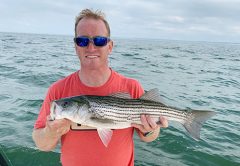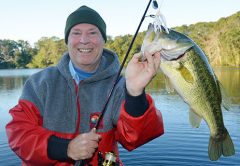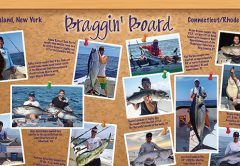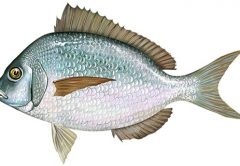The Holidays are over and I hope you all had a happy and healthy time with your families! The fishing in the Western Sound ended quickly this year, although there were some nice bass caught on live herring in the last few weeks of the season. If you like herring they will be around most of the winter and are fairly easy to catch and there is still a chance of some good Cod fishing on the east end of Long Island, weather permitting.
Herring can be caught at the fishing pier at Bar Beach in Port Washington and make a good excuse to get out of the house. A light spinning outfit, a herring rig and a small tin lure with the hooks removed are all you need to catch these tasty fish. The early morning is usually the best time, but get there early as this is a popular spot and will get crowed when the fish are in. if this is your first attempt at Herring, go down and watch what the regulars do and imitate them; a lot of these fishermen are down there every day and do quite well. It’s pretty simple as you drop your rig to bottom and jig it up and down until you feel a fish, then reel them in. When the fish are thick you can get three or four at a time.
Herring taste great pickled and will last for a few weeks when refrigerated and it’s not hard to prepare them. The first thing is to scale them; I suggest you do this outside, it’s a messy job and better done where you won’t upset the wife. The fish then need to be filleted, a few bones won’t matter as they will dissolve in the brine solution; wash the fish in fresh water, drain and place in a container loosely and cover with a brine solution (3/4 cup kosher salt, quart of water and half a quart of white vinegar) at a cool temperature for twenty-four to thirty-six hours.
The fish must be removed before the skin starts to wrinkle or lose color; the amount of time depends on the temperature of brine and the freshness of the herring. The herring are then removed from the brine, soaked in cold water for four to six hours to desalinize and drained well. Then place 3/4 cup white vinegar, 1 1/2 cup water, 3/4 cup sugar, and a heaping tablespoon of pickling spice in a sauce pan, bring it to a boil then let it simmer for ten minutes. While the brine is cooking, slice three to four large onions (I like lots of onions) and cut the herring into 1 1⁄2 inch pieces; fill your mason jars with the onions and Herring layering them to almost the top of jar, then pour the hot brine solution into the jar covering all and seal the containers. When the jars have cooled to room temperature put them in the refrigerator for five days before eating. The unsealed jars will last up to four weeks in the refrigerator.
Another tasty Herring treat is “Brat Herring”; clean the Herring as shown above. Dredge the Herring Filets in flour mixed with salt and pepper; then pan fry them till golden brown and place on paper towels. Cut onions slices, cover the bottom of a Pyrex pan with the onions, layer the herring filets over them and cover them with more onions. Make the same pickling solution as above except add a teaspoon of salt, cook it the same amount of time, cover your filets, onions, place a cover on container and refrigerate for three to four days. Take out a portion, add a generous dollop of sour cream and chow down. This is my favorite way to eat Herring. The “Brat Herring” recipe is courtesy of Grandma Benkert and my fishing buddy Gary Benkert of the Benkert bakery family.
This also is the time of year to go through all your tackle, remove old line from your reels and have them serviced by your local tackle shop or do it yourself if you’re so inclined, then put fresh line on for the upcoming season; it really hurts when you break off a fish in the Spring because of a sticky drag or worn line. Check all the guides on your rods; make sure there are no nicks on the inside of guides that will cause your line to break. An easy way to do this is to rub a Q-Tip around the inside of each guide; if some cotton sticks to the guide you should replace the guide. Inventory all of your terminal tackle; hooks, barrel swivels, fish finder rigs, sinkers, plugs and bucktails, etc., so you know what you will need to purchase for the upcoming season. Check the hooks on your plugs and replace them where needed; again it might save that big Striped Bass. A lot of this might seem like overkill, but to catch a trophy fish you and your tackle must be prepared to do so! Always fish ready to catch that big one and you will!
Lastly, follow the local fishing reports; there are many Party and Charter boats that sail all winter long from Sheepshead Bay, Freeport, Captree, Shinnecock and Montauk. If you watch the weather there are many opportunities to get some great fishing in. Have faith in these Captains and their crew; they WANT you to catch! Listen to their advice. Be prepared for the cold; a good pair of insulated boots, lots of layers, a good hat and fishing skins that will keep you dry will make your day comfortable. There’s never too much to bring in the winter to wear, you can always take something off.
There is also some great trout fishing on Long Island, you can keep three per day and it’s another great way to satisfy your fishing urges.
If you have any comments or suggestions, you can drop me a line at capttommykampa@gmail.com
[easy-social-share]









